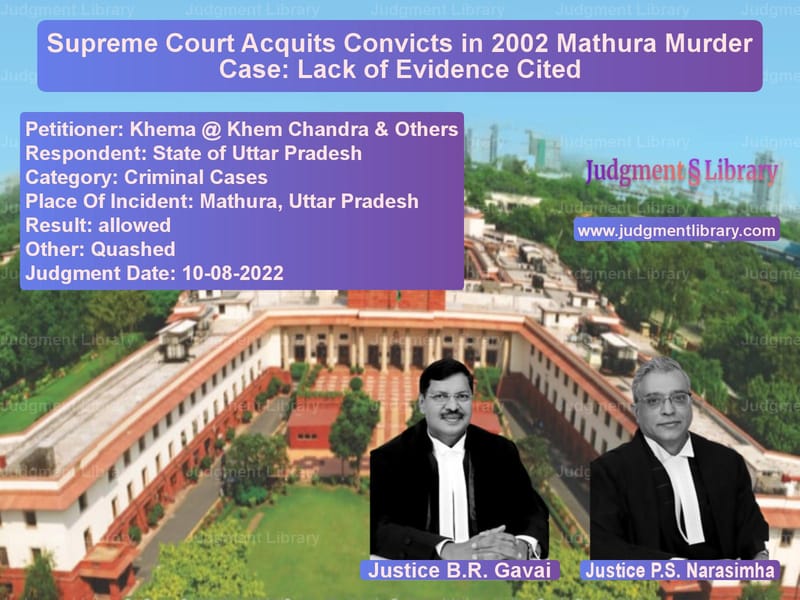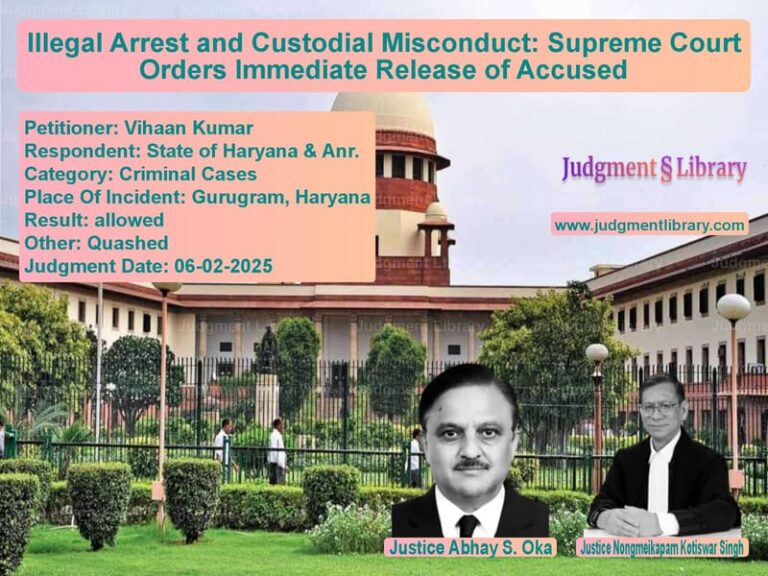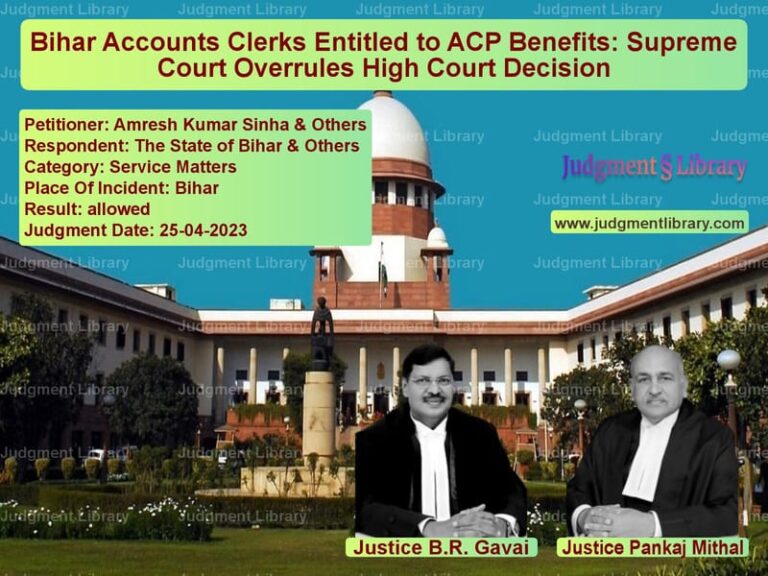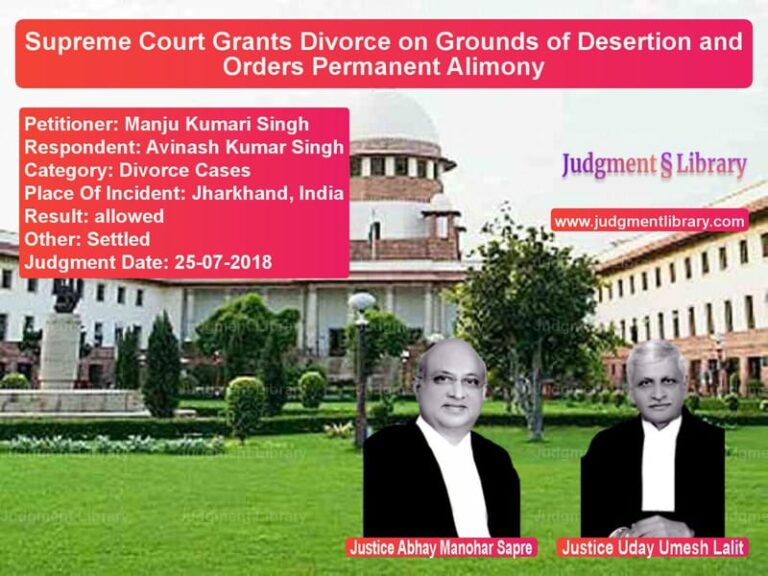Supreme Court Acquits Convicts in 2002 Mathura Murder Case: Lack of Evidence Cited
The case of Khema @ Khem Chandra & Others vs. State of Uttar Pradesh revolved around a gruesome murder that took place in 2002 in Mathura. The appellants had been convicted under Section 302 read with Section 149, Section 307 read with Section 149, and Section 148 of the Indian Penal Code (IPC). After nearly two decades of litigation, the Supreme Court acquitted the accused, citing inconsistencies in the prosecution’s case and granting the benefit of the doubt to the appellants.
Background of the Case
The incident occurred on April 27, 2002, when the deceased, Prakash, and his wife, Kripa, were going to invite relatives for their daughters’ wedding. According to the prosecution, the accused persons, who were allegedly hiding in the house of Deepi, suddenly came out and attacked Prakash and his family. The attack was brutal, and Prakash was killed on the spot. His brother Inder (PW-2) and wife Kripa also suffered injuries in the attack.
Omveer (PW-1), another brother of the deceased, lodged an FIR at the Shergarh police station at 10:10 AM, naming six accused: Deepi, Kanhaiya, Khema @ Khem Chandra, Jasram, Balveer, and Mahaveer. The charges were framed under Sections 147, 148, 149, 302, 307, and 506 of the IPC, along with charges under the Arms Act.
Read also: https://judgmentlibrary.com/supreme-court-sets-aside-conviction-in-karnataka-murder-case/
Trial and Conviction
The trial court convicted the accused based on the testimonies of the witnesses and forensic evidence. They were sentenced to life imprisonment with a fine of Rs. 5,000 each. The High Court of Allahabad upheld the conviction on April 30, 2019, dismissing the appeals filed by the accused.
Appeal Before the Supreme Court
The convicted individuals approached the Supreme Court, challenging their conviction on the grounds that:
- The prosecution had failed to prove their guilt beyond a reasonable doubt.
- The testimonies of the prosecution witnesses were inconsistent and unreliable.
- The recoveries of the alleged murder weapons were fabricated.
- Important witnesses, including independent eyewitnesses, were not examined.
Arguments Presented
Petitioners’ (Accused) Arguments
- The appellants argued that the prosecution had failed to present a consistent and reliable case.
- They pointed out that the primary witness, Omveer (PW-1), admitted in cross-examination that he was inside his house when the shooting happened, which contradicted his earlier claims of being an eyewitness.
- They claimed that Inder (PW-2), another alleged eyewitness, had inconsistencies in his medical records regarding the time and nature of his injuries.
- The defense also contended that the recovery of weapons was staged, as no independent witnesses signed the seizure memo.
- They argued that critical witnesses, including Vijay Singh, the deceased’s brother who first informed the police, were not examined, casting doubt on the prosecution’s case.
Respondent’s (State of Uttar Pradesh) Arguments
- The prosecution asserted that the testimonies of Omveer (PW-1) and Inder (PW-2) were credible and that minor inconsistencies should not undermine the entire case.
- They argued that Inder (PW-2) was an injured witness, and his presence at the crime scene was established beyond doubt.
- The prosecution also relied on the forensic evidence and the recovery of weapons from the accused to corroborate their involvement in the crime.
- They cited previous judgments where minor contradictions did not lead to acquittal.
Supreme Court’s Analysis and Judgment
The Supreme Court carefully examined the inconsistencies and contradictions in the prosecution’s case and highlighted the following points:
Key Observations by the Supreme Court
- The Court noted that the testimony of Omveer (PW-1) was unreliable since he admitted in cross-examination that he was inside his house when the firing occurred.
- The medical records of Inder (PW-2) showed discrepancies. His injury was recorded at 10:20 PM, while he claimed to have been examined in the morning.
- The Court expressed concerns about the recovery of weapons, noting that no independent witnesses were present during the seizure.
- It observed that the prosecution failed to bring key witnesses like Vijay Singh, who initially reported the crime.
- The Supreme Court reiterated that in cases of previous enmity, the possibility of false implication cannot be ruled out.
Key Court Statement
“The possibility of some fabrication in the injury certificate cannot be rejected… the prosecution’s failure to examine independent witnesses and the inconsistencies in testimonies create reasonable doubt in the case.”
Final Judgment
- The Supreme Court allowed the appeals, overturning the convictions.
- The trial court and High Court judgments were quashed.
- The accused were acquitted of all charges and ordered to be released immediately if not required in any other case.
Implications of the Judgment
This ruling has significant implications for criminal trials:
- It reinforces the principle that inconsistencies in witness testimonies can create reasonable doubt.
- It highlights the importance of forensic evidence being free from manipulation or doubt.
- It sets a precedent that courts must scrutinize cases where independent witnesses are not examined.
- It upholds the principle that an accused must be given the benefit of the doubt in cases of procedural lapses.
Conclusion
The Supreme Court’s decision in this case is a landmark ruling that underscores the importance of due process and fair trial principles. While justice must be served, it cannot be based on unreliable evidence or procedural lapses. The ruling ensures that the burden of proof remains firmly on the prosecution and that courts must exercise caution in upholding convictions where doubt persists.
Petitioner Name: Khema @ Khem Chandra & Others.Respondent Name: State of Uttar Pradesh.Judgment By: Justice B.R. Gavai, Justice P.S. Narasimha.Place Of Incident: Mathura, Uttar Pradesh.Judgment Date: 10-08-2022.
Don’t miss out on the full details! Download the complete judgment in PDF format below and gain valuable insights instantly!
Download Judgment: khema-@-khem-chandra-vs-state-of-uttar-prade-supreme-court-of-india-judgment-dated-10-08-2022.pdf
Directly Download Judgment: Directly download this Judgment
See all petitions in Murder Cases
See all petitions in Bail and Anticipatory Bail
See all petitions in Evidence Law
See all petitions in Other Cases
See all petitions in Judgment by B R Gavai
See all petitions in Judgment by P.S. Narasimha
See all petitions in allowed
See all petitions in Quashed
See all petitions in supreme court of India judgments August 2022
See all petitions in 2022 judgments
See all posts in Criminal Cases Category
See all allowed petitions in Criminal Cases Category
See all Dismissed petitions in Criminal Cases Category
See all partially allowed petitions in Criminal Cases Category







